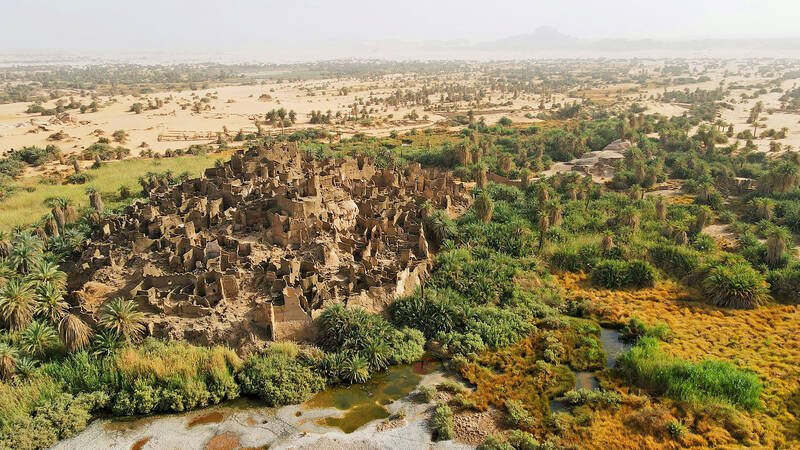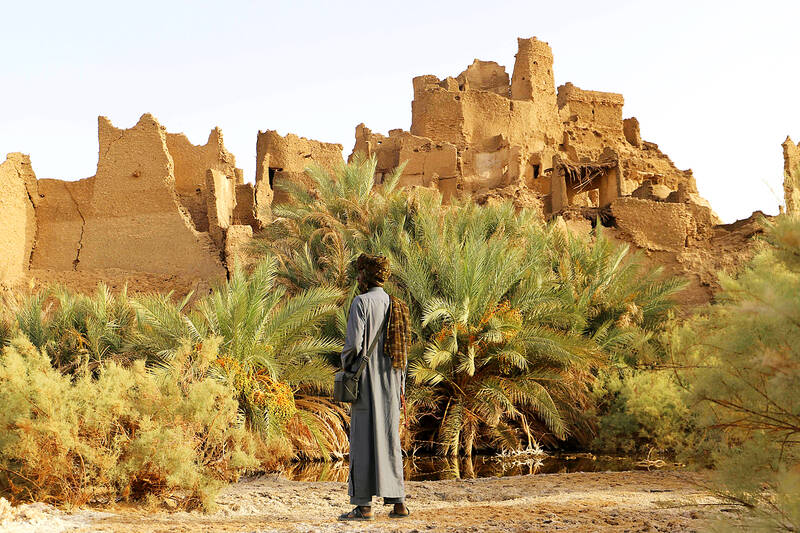A long trek across the desert of northeastern Niger brings visitors to one of the most astonishing and rewarding sights in the Sahel: fortified villages of salt and clay perched on rocks with the Saharan sands laying siege below.
Generations of travelers have stood before the “ksars” of Djado, wondering at their crenelated walls, watchtowers, secretive passages and wells, all of them testifying to a skilled, but unknown hand.
Who chose to build this outpost in a scorched and desolate region — and why they built it — are questions that have never been fully answered. Just as beguiling is why it was abandoned. No archeological dig or scientific dating has ever been undertaken to explain the mysteries.

Photo: AFP
Djado lies in the Kawar oasis region 1,300km from the capital, Niamey, near Niger’s deeply troubled border with Libya.
Once a crossroads for caravans trading across the Sahara, Kawar today is a nexus for drug and arms trafficking.
Its grim reputation deters all but the most determined traveler.

Photo: AFP
“There have been no foreign tourists since 2002,” said Sidi Aba Laouel, the mayor of Chirfa, the commune where the Djado sites are located.
“When tourism was good, there was economic potential for the community,” he said.
A blessing of sorts occurred in 2014, when gold was discovered. It saw an influx of miners from across West Africa, bringing life and some economic respite, but also bandits who hole up in the mountains.
Few of the newcomers seem interested to visit the ksars.
The mayor is careful when speaking about local history, acknowledging the many gaps in knowledge.
He said he has old photocopies in his cupboard of a work by Albert le Rouvreur, a colonial-era French military officer stationed in Chirfa, who tried without success to shed light on the origins of the site.
The Sao, present in the region since antiquity, were the first known inhabitants in Kawar, and perhaps established the first fortifications, but the time line of their settlement is hazy. Some of the ksars still standing have palm roofs, suggesting they were built later.
Between the 13th and the 15th centuries, the Kanuri people established themselves in the area. Their oasis civilization was almost destroyed in the 18th and 19th centuries by successive waves of nomadic raiders — the Tuaregs, Arabs and finally the Toubou.
The arrival of the first Europeans in the early 20th century spelt the beginning of the end of the ksars as a defense against invaders. The French military took the area in 1923.
Today, the Kanuri and Toubou have widely intermingled, but the region’s traditional leaders, called the “mai,” descend from the Kanuri lineage.
They act as authorities of tradition, as well as being custodians of oral history, but even for these custodians, much remains a mystery.
“Even our grandfathers didn’t know. We didn’t keep records,” said Kiari Kelaoui Abari Chegou, a Kanuri leader.
About 300km to the south of Djado lies the Fachi oasis, famous for its fortress and old town, with the walls still almost intact. Some symbolic sites of the ancient city are still used for traditional ceremonies.
A traditional authority of Fachi, Kiari Sidi Tchagam said that the fortress is “at least two hundred years old.”
“According to our information, there was an Arab who had come from Turkey, it was he who gave people the idea of making the fort there,” he said, echoing theories of Turkish influence.
While the ruins are a point of pride, descendants are worried the fragile salt buildings, threatened by rain, are not properly safeguarded.
Since 2006, Djado has languished on a tentative list of UNESCO World Heritage Sites.
“It’s really crucial it’s registered as a UNESCO World Heritage Site,” Tchagam said. “We are reminded of ourselves in this fort, it’s a part of our culture, [it’s] our entire history.”

‘UNUSUAL EVENT’: The Australian defense minister said that the Chinese navy task group was entitled to be where it was, but Australia would be watching it closely The Australian and New Zealand militaries were monitoring three Chinese warships moving unusually far south along Australia’s east coast on an unknown mission, officials said yesterday. The Australian government a week ago said that the warships had traveled through Southeast Asia and the Coral Sea, and were approaching northeast Australia. Australian Minister for Defence Richard Marles yesterday said that the Chinese ships — the Hengyang naval frigate, the Zunyi cruiser and the Weishanhu replenishment vessel — were “off the east coast of Australia.” Defense officials did not respond to a request for comment on a Financial Times report that the task group from

DEFENSE UPHEAVAL: Trump was also to remove the first woman to lead a military service, as well as the judge advocates general for the army, navy and air force US President Donald Trump on Friday fired the chairman of the Joint Chiefs of Staff, Air Force General C.Q. Brown, and pushed out five other admirals and generals in an unprecedented shake-up of US military leadership. Trump wrote in a post on Truth Social that he would nominate former lieutenant general Dan “Razin” Caine to succeed Brown, breaking with tradition by pulling someone out of retirement for the first time to become the top military officer. The president would also replace the head of the US Navy, a position held by Admiral Lisa Franchetti, the first woman to lead a military service,

Four decades after they were forced apart, US-raised Adamary Garcia and her birth mother on Saturday fell into each other’s arms at the airport in Santiago, Chile. Without speaking, they embraced tearfully: A rare reunification for one the thousands of Chileans taken from their mothers as babies and given up for adoption abroad. “The worst is over,” Edita Bizama, 64, said as she beheld her daughter for the first time since her birth 41 years ago. Garcia had flown to Santiago with four other women born in Chile and adopted in the US. Reports have estimated there were 20,000 such cases from 1950 to

CONFIDENT ON DEAL: ‘Ukraine wants a seat at the table, but wouldn’t the people of Ukraine have a say? It’s been a long time since an election, the US president said US President Donald Trump on Tuesday criticized Ukrainian President Volodymyr Zelenskiy and added that he was more confident of a deal to end the war after US-Russia talks. Trump increased pressure on Zelenskiy to hold elections and chided him for complaining about being frozen out of talks in Saudi Arabia. The US president also suggested that he could meet Russian President Vladimir Putin before the end of the month as Washington overhauls its stance toward Russia. “I’m very disappointed, I hear that they’re upset about not having a seat,” Trump told reporters at his Mar-a-Lago resort in Florida when asked about the Ukrainian